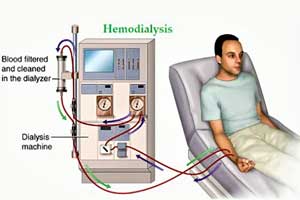- Home
- Editorial
- News
- Practice Guidelines
- Anesthesiology Guidelines
- Cancer Guidelines
- Cardiac Sciences Guidelines
- Critical Care Guidelines
- Dentistry Guidelines
- Dermatology Guidelines
- Diabetes and Endo Guidelines
- Diagnostics Guidelines
- ENT Guidelines
- Featured Practice Guidelines
- Gastroenterology Guidelines
- Geriatrics Guidelines
- Medicine Guidelines
- Nephrology Guidelines
- Neurosciences Guidelines
- Obs and Gynae Guidelines
- Ophthalmology Guidelines
- Orthopaedics Guidelines
- Paediatrics Guidelines
- Psychiatry Guidelines
- Pulmonology Guidelines
- Radiology Guidelines
- Surgery Guidelines
- Urology Guidelines
More than half of elderly CKD patients die within a year of beginning dialysis: JAMA

More than half of elderly patients of CKD die within a year of beginning dialysis and nearly one in four succumbed to the disease within a month of doing so.
According to the findings of a new study, Older Adults with end-stage kidney disease starting Dialysis die at rates higher than previously thought. In fact close to 55 per cent of people older than age 65 who start dialysis treatment die within a year.
The results of the analysis have been published in JAMA Internal Medicine.
Dialysis involves the use of a machine to purify a patient’s blood from toxins in patients of end-stage kidney disease. In some patients, it acts as a bridge to kidney transplantation, but the majority of dialysis patients, particularly those who are older, do not get kidney transplants. The elderly population of patients of chronic Kidney disease is increasing and according to an estimate, more than 60,000 people in the United States who started dialysis in 2015, were older than 65.
“Dialysis can seem like a magical cure for someone whose kidneys are failing, but our finding that half of older adults die within the first year after starting dialysis is sobering,” said lead author Melissa Wachterman, an assistant professor of medicine at Harvard Medical School, and a physician at VA Boston in a news release.
“When time is short, how you spend that time becomes even more important,” she said. “Spending the better part of three days a week doing dialysis may not be the right choice for everyone and people should factor this new evidence into their decisions.”
The newly reported death rates are almost twice as high as widely cited statistics from government data sources, a finding that suggests physicians and patients may be basing treatment decisions on overly optimistic survival estimates, the researchers said.
The results are based on an analysis of a small but representative sample of national outcomes data among Medicare patients, 65 and older, who started receiving dialysis between 1998 and 2014. The sample included outcomes for 391 such patients. Of those, 68 were 85 years of age or older, 89 required assistance with daily activities and 267 had four or more major medical problems. Of the 391 patients in the analysis, 286 (73 percent) started dialysis in the hospital rather than on an outpatient basis. Nearly 23 percent of patients (88 people) died within a month of starting dialysis. Nearly 45 percent (173 people) died within six months, and nearly 55 percent (213) died within the year.
The study also reveals higher death rates among several groups: those over age 85, those who had four or more major medical problems in addition to kidney failure, those who started dialysis in the hospital, and those who, even before starting dialysis, needed help from other people with basic tasks of daily living such as eating or bathing.
The researchers say their findings should help older patients, their families and the physicians who treat them make better-informed choices based on more realistic outcomes.
Contrary to a popular belief among many patients, dialysis is not the only choice for end-stage kidney disease, Wachterman noted. Another approach to managing kidney failure is conservative care in which patients receive medications and other therapies to relieve the symptoms of kidney disease, without starting dialysis.
People generally don’t live as long, but they can avoid the burden and potential harms of dialysis, the researchers said. This conservative approach to care, which focuses on aggressive management of symptoms such as pain and trouble breathing, is well-established in the United Kingdom and other countries, but, generally has not been developed as a common model of care in the United States.
“The goal in difficult clinical situations like this is shared decision-making, where patients and clinicians can work together to make choices that best balance patients’ goals and values with the objective medical evidence,” Wachterman said.
“We may have been painting an overly rosy picture for some patients as to what things will look like after starting dialysis,” she said. “We hope this new evidence can help patients and families cope with what lies ahead and empower them to make informed treatment decisions that are most aligned with their goals and preferences.”
Study results may certainly help inform patient decisions, physician choice of treatment for end-stage kidney disease.
Author Dr.Kartikeya Kohli DNB (Medicine), MRCP, Fellow DNB(Nephrology) is a Consultant Physician and Nephrologist at Sanjeevan Hospital, New Delhi

Disclaimer: This site is primarily intended for healthcare professionals. Any content/information on this website does not replace the advice of medical and/or health professionals and should not be construed as medical/diagnostic advice/endorsement or prescription. Use of this site is subject to our terms of use, privacy policy, advertisement policy. © 2020 Minerva Medical Treatment Pvt Ltd